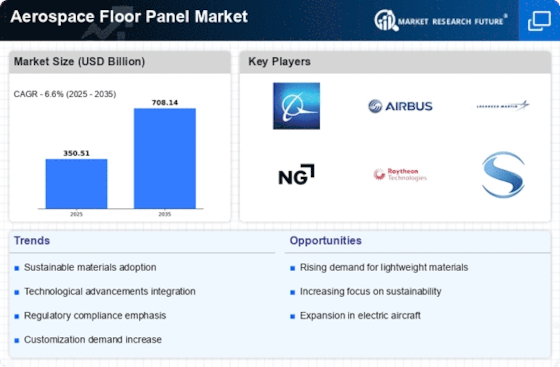Market Trends
Key Emerging Trends in the Aerospace Floor Panel Market
The Aerospace Floor Panel market is witnessing significant trends driven by technological advancements, material innovations, and the growing demand for lightweight and durable aircraft interiors. Floor panels are critical components of aircraft interiors, providing structural support, noise reduction, and aesthetic appeal while meeting stringent safety and performance requirements. One notable trend in the market is the increasing adoption of advanced materials such as composites, honeycomb structures, and lightweight alloys to manufacture aerospace floor panels. These materials offer superior strength-to-weight ratios, corrosion resistance, and fire-retardant properties compared to traditional materials like aluminum, allowing for lighter and more fuel-efficient aircraft designs while maintaining structural integrity and safety standards.
Moreover, advancements in manufacturing processes and automation technologies are driving market trends in the Aerospace Floor Panel sector. Companies are investing in automated manufacturing systems, robotics, and digital technologies to streamline production processes, improve efficiency, and reduce production costs. Automated manufacturing enables the mass production of floor panels with consistent quality and precision, ensuring compliance with strict aerospace regulations and customer specifications. Additionally, digital design tools and simulation software allow for rapid prototyping and optimization of floor panel designs, enabling manufacturers to iterate quickly and bring innovative products to market faster.
Furthermore, market trends in the Aerospace Floor Panel sector are influenced by the growing demand for customizable and modular cabin interiors. As airlines seek to differentiate their passenger experience and cater to diverse customer preferences, there is a rising demand for customizable cabin configurations, seating layouts, and amenities. Modular floor panel systems offer flexibility and versatility, allowing airlines to reconfigure cabin interiors quickly to accommodate different seating arrangements, class configurations, and in-flight entertainment options. Additionally, modular floor panels facilitate easier maintenance, repair, and replacement, reducing downtime and operational disruptions for airlines.
Moreover, sustainability considerations are driving market trends in the Aerospace Floor Panel sector. With increasing awareness of environmental issues and regulatory pressure to reduce carbon emissions and waste generation, aerospace manufacturers are exploring sustainable materials and manufacturing processes for floor panels. Companies are developing recyclable composites, bio-based resins, and eco-friendly coatings to minimize the environmental impact of floor panel production and disposal. Additionally, manufacturers are implementing energy-efficient manufacturing techniques, waste reduction measures, and supply chain sustainability initiatives to enhance the overall sustainability of aerospace floor panel manufacturing operations.
Additionally, market trends in the Aerospace Floor Panel sector are shaped by the impact of the COVID-19 pandemic on the aviation industry. As airlines grapple with reduced passenger demand, financial constraints, and uncertainty about the pace of recovery, there is a growing emphasis on cost containment, efficiency optimization, and fleet rationalization. Aerospace manufacturers are facing challenges related to order cancellations, production delays, and excess inventory, prompting them to reassess their production capacity, supply chain resilience, and business strategies. However, the pandemic has also highlighted the importance of cabin hygiene, cleanliness, and infection control, driving demand for antimicrobial and easy-to-clean floor panel materials and finishes.
Furthermore, market trends in the Aerospace Floor Panel sector are influenced by regulatory requirements and safety standards. Aerospace regulatory agencies such as the Federal Aviation Administration (FAA) and the European Union Aviation Safety Agency (EASA) impose stringent requirements for aircraft interior materials, fire resistance, smoke toxicity, and crashworthiness. Compliance with these regulations is a key consideration for aerospace floor panel manufacturers, who must ensure that their products meet the highest safety and performance standards to obtain certification for use in commercial aircraft. Additionally, manufacturers must stay abreast of evolving regulatory requirements and industry standards to maintain their competitive edge and ensure market acceptance of their floor panel products.


















Leave a Comment